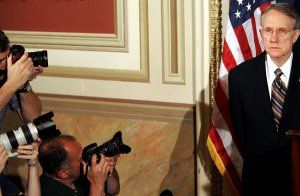
Over at Esquire former Bush speechwriter David Frum has a sensible suggestion for President Obama: create an infrastructure bank to select and pay for transportation projects on the basis of merit instead of allowing meddlesome congressional earmarking. This would, theoretically, protect the obvious need for economically stimulative infrastructure investment from conservative complaints about wasteful, politically motivated spending. "I'd suggest we have seven directors of the bank," writes Frum. "Three would be nominated by the president and confirmed by the Senate."
As anyone who has followed the various political dramas involving presidential on the Equal Employment Opportunity Commission, the Federal Communications Commission, the National Labor Relations Board, or, for that matter, the Supreme Court can tell you, presidential appointees are not immune from making politically motivated decisions, much less accusations of doing so.
But that was not my first thought upon reading Frum's proposal. Instead it was, "Oh, great, just what we need: three more jobs to sit vacant while Senate Republicans block President Obama's nominees for no reason besides obstructionism as its own reward." Currently, as Chief Justice John Roberts complained in a year-end report, there are more than 90 judicial vacancies in U.S. district and appellate courts. At the end of the 111th Congress there were 43 presidential nominees, including judges, waiting for the Senate to vote on them. Many of these are not even controversial and will be moved eventually. But there is also an increasing number of nominees who are held up indefinitely and eventually bow out because one extremist senator objects to one ill-advised comment the nominee once made. And then there is the miserable experience of having one's personal past pored over by the Senate opposition in the hopes of finding a minor tax problem.
All this inefficiency and unpleasantness may discourage talented officials from pursuing or accepting presidential appointments. Maybe the Senate minority wants that, but they certainly don't want all of the unintended consequences, such as presidents circumventing the Senate, as Obama recently did by creating a special position for Elizabeth Warren at the Bureau of Consumer Financial Protection to avoid a fight over her nomination to run the agency.
But if we've gotten to the point of saying that the creation of new agencies is off-limits just to avoid the Senate's dysfunctional confirmation procedure, then clearly that procedure needs to be reformed. That's why Senate Democrats have been pushing to do exactly that. They want to return the filibuster to its earlier incarnation, where the minority had to actually speak indefinitely, switch from two filibuster-breaking votes for each bill to only one, and other changes meant to break the legislative logjam. But, as The Washington Post reports, this will not come to pass. Senate leaders will end the current opening session without having reached a deal to pass filibuster reform. That leaves reformers with only the hope of passing rules changes in the middle of the term on a simple majority vote, requiring the approval of Vice President Joe Biden, who acts as president of the Senate. It is unclear how Biden would rule on such a maneuver. (In 2005, when Republicans wanted to do this for judicial nominees, it was known as the "nuclear option.")
Realistically, though, it looks as if only partial reform, focused on reducing individual senatorial holds on nominees, is likely to obtain bipartisan support and pass. Until that happens and we can see how it works in practice, we may want to hold off on increasing the number of jobs that require Senate confirmation.
Uncommon Knowledge
Newsweek is committed to challenging conventional wisdom and finding connections in the search for common ground.
Newsweek is committed to challenging conventional wisdom and finding connections in the search for common ground.
About the writer
To read how Newsweek uses AI as a newsroom tool, Click here.








